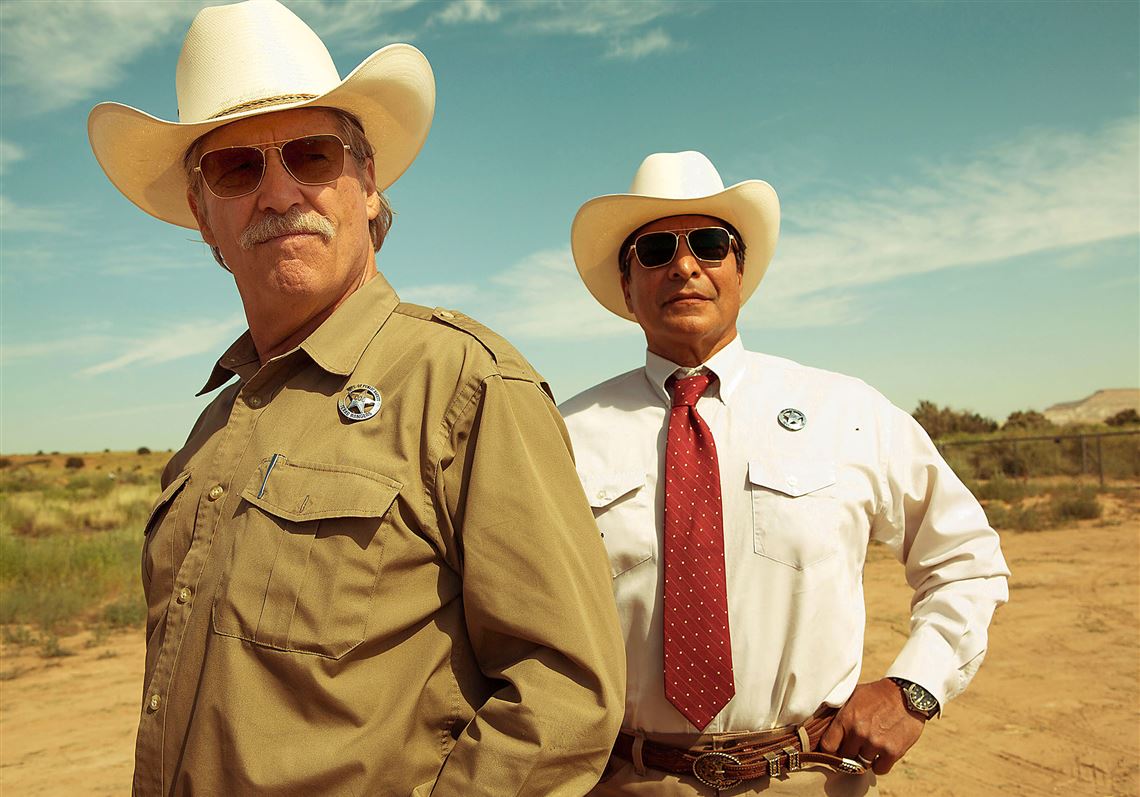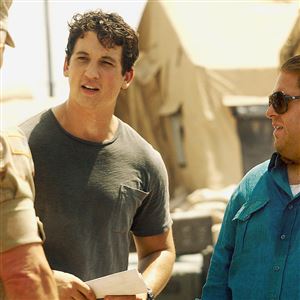A lone Texas Ranger and his faithful half-Indian companion are out to catch a pair of bank robber brothers come “Hell or High Water” — the most intriguing neo-Western to hit the screen since “No Country for Old Men.”
Ex-con Tanner and ex-husband Toby Howard are fraternal ne’er-do-wells of opposite personality, one gung-ho impetuous, the other quietly calculating. Toby (Ben Foster) hatches a bank heist designed to save their hardscrabble family ranch for his estranged sons. He has chosen his targets carefully: one-horse West Texas towns just big enough to have a poorly guarded Texas Midlands branch. Easy pickings. Tanner (Chris Pine) is to provide backup muscle and crazy adrenaline.
Starring: Jeff Bridges, Ben Foster, Chris Pine.
Rating: R for strong violence, language throughout and brief sexuality.
They’re bluer than the blues brothers, with more chips on their shoulders than in the casinos where they “invest” their loot. But for serial bank robbers, there’s one danger worse than failure: success. That’s when impulse and overconfidence infect the team.
The other team — the cops chasing the brother robbers — is more laconic, but has its own gung-ho and reticent components: Canny old Texas Ranger Marcus (Jeff Bridges) is retiring but not shy. His long-suffering silent sidekick Alberto (Gil Birmingham) — half Indian, half Hispanic — is as annoyed by Marcus’ quirky “instincts” as by his incessant racist jokes and insults.
But the two teams have one crucial thing in common: looking out for each other.
British director David MacKenzie (“Starred Up,” “Perfect Sense”) benefits from screenwriter Taylor Sheridan’s talents. Here, as with Mr. Sheridan’s “Sicario” (2015) script — in which an idealistic FBI agent struggles to confront the escalating violence of the U.S.-Mexico drug trade — semi-stereotypical characters gradually sharpen as the narrative clarifies the forces that shaped and exploited them. In this case, it’s the all-powerful banks and oil companies.
Uniformly fine performances include both beer-besotted brothers, sad-eyed Mr. Pine and wild-eyed Mr. Foster (who killed their dad in a dubious “hunting accident”). Dale Dickey as Toby’s ex-wife is a haunting presence, and ancient Margaret Bowman has a hilarious turn as a a waitress from hell at the Famous T-Bone Cafe.
But the show is predictably stolen by Mr. Bridges in dogged pursuit, chewing his words and his cud. His teeth are bothering him somethin’ fierce, from start to finish, and he’s terrific.
Sun-baked West Texas — actually New Mexico in the location shooting — is a powerful “character” itself, its dead and dying towns awash in poverty (“inherited generation to generation, like a disease”), shuttered storefronts and rusty windmills. The signs tell the story: “Closing Down,” “In Debt?” “Fast Cash When U Need It.” Gun-totin’ citizen vigilantes compound rather than thwart crimes. Dusty sunrises and sunsets are hauntingly captured by cinematographer Giles Nuttgens, while Nick Cave and Warren Ellis provide a fine soundtrack with songs like “Dollar Bill Blues” and “An Outlaw State of Mind.”
The gloom and impending doom are leavened by darkly humorous dialogue and moments of odd levity, including Marcus’ ruminations on death. Two mismatched buddy relationships and two sets of existential crises are intertwined here, with heavy-handed but legitimate sociopolitical commentary in the process. Shades and themes of “Bonnie and Clyde” and “Dog Day Afternoon.”
If the familiar character types tread some familiar territory, they’re imbued with credible humanity, and the solidly executed film is imbued with tense action and momentum, up to and including a climactic retro-shootout in the rocks.
Mr. Mackenzie doesn’t rival the Coen Brothers. Tanner and Toby don’t rival the Karamazovs. But crime and punishment are always more fascinating when complicated by brotherly love.
Post-Gazette film critic emeritus Barry Paris: parispg48@aol.com.
First Published: August 19, 2016, 4:00 a.m.

















